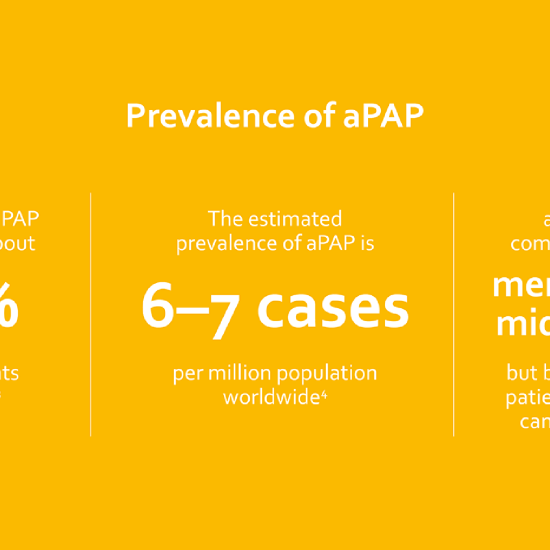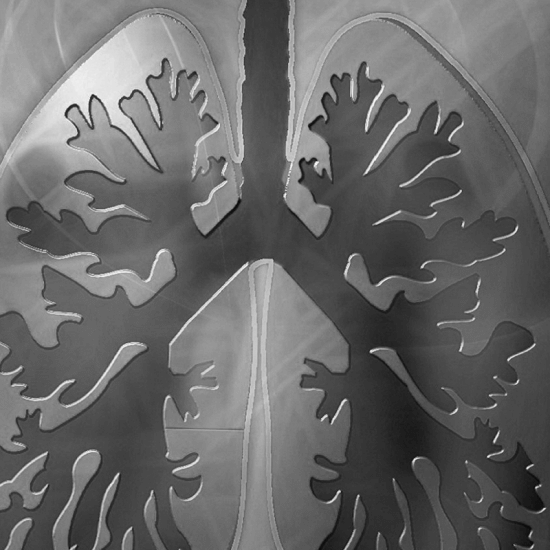22nd August 2022
Insights into Autoimmune Pulmonary Alveolar Proteinosis
What is Autoimmune Pulmonary Alveolar Proteinosis (aPAP)?
aPAP is a disease that belongs to a family of distinct, rare lung diseases collectively referred to as PAP.1 With aPAP, the alveoli (tiny air sacs) of the lungs become filled with an oily, protein-type material called ‘surfactant’.2 Surfactant is a substance that lines the alveoli and prevents the lungs from collapsing.1 In PAP, surfactant is not cleared properly or too much is produced, preventing the alveoli from efficient gas exchange.1
What causes aPAP?
aPAP is caused by an autoimmune response to granulocyte-macrophage colony-stimulating factor (GM-CSF).2 GM-CSF is a protein which immune cells – macrophages – need to clear surfactant from alveoli.2 The autoimmune response reduces the ability of marcophages to remove surfactant from alveoli and leads to surfactant build-up. As a result, the lungs cannot get oxygen into the bloodstream as easily as normal, leading to breathlessness, coughing and chest pain.1

Common symptoms of aPAP2
• Fatigue
• Shortness of breath
• Cough
• Reduced exercise capacity
• Sputum production
There is a need for a convenient and efficacious medicinal treatment
Today, there are no approved pharmaceutical treatments available for aPAP. The current standard of care is a whole lung lavage (WLL), which does not treat the underlying cause of the disease. WLL is a procedure, performed under general anaesthesia, that physically removes surfactant from the lungs. It is an invasive and inconvenient procedure that must be performed by highly experienced physicians at specialist sites and necessitates hospitalisation and admission to intensive care afterwards. It does not cure aPAP and may only provide temporary symptomatic relief.2
Molgramostim in aPAP
Molgramostim nebulizer solution is a non-glycosylated form of recombinant human GM-CSF. The biopharmaceutical company, Savara, is developing an inhaled formulation as a potential treatment option for aPAP. They believe that inhalation of molgramostim activates macrophages in the lung alveoli, thus potentially restoring the surfactant-clearing activity of the alveolar macrophages and considerably improving oxygenation. Molgramostim has been granted Orphan Drug Designation for treating aPAP by the U.S. Food and Drug Administration (FDA) and the European Medicines Agency (EMA). It was also granted Fast Track Designation and Breakthrough Therapy Designation by the FDA.5
Inhaled Molgramostim in Autoimmune Pulmonary Alveolar Proteinosis (IMPALA) Trial
The IMPALA trial, a Phase 2/3 randomised, double-blind, placebo-controlled trial of molgramostim in 139 patients with aPAP, is the largest controlled clinical trial in this rare disease. This trial was conducted in 18 countries, including the U.S., Japan, and various European countries. The trial concluded that in patients with aPAP, daily administration of inhaled molgramostim results in greater improvements in pulmonary gas transfer and functional health status.6 The IMPALA-2 trial is currently being carried out to discover whether the investigational drug, molgramostim, is safe and effective for improving lung function in adults living with aPAP.5
For more details of the trial, please visit https://savarapharma.com/development/clinical-trials/.
References
1. Pulmonary alveolar proteinosis. Available at: https://www.rbht.nhs.uk/our-services/pulmonary-alveolar-proteinosis. Accessed July 2022.
2. What is aPAP? Available at: https://savarapharma.com/our-science/apap/. Accessed July 2022.
3. aPAP Background. Available at: https://savarapharma.com/our-science/apap-background/. Accessed July 2022.
4. Genetic determinants of risk in autoimmune pulmonary alveolar proteinosis. Available at: https://www.nature.com/articles/s41467-021-21011-y. Accessed July 2022.
5. What is molgramostim? Available at: https://savarapharma.com/development/molgramostim-in-apap/. Accessed July 2022.
6. Trapnell BC, Inoue Y, Bonella F, et al. Inhaled Molgramostim Therapy in Autoimmune Pulmonary Alveolar Proteinosis. N Engl J Med. 2020;383(17):1635-1644.

